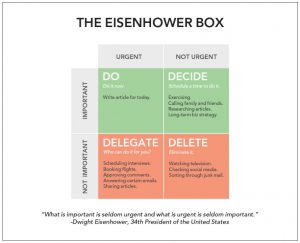You can’t buy time

Top tips to improve your time management skills
Despite what people say, time is not a commodity. It cannot be traded, expanded or reduced. It is fixed. Our perception of time, however, is another concept. How often do you think at 4pm “Where has the day gone?” and go into panic mode to try to achieve as much as possible before the day is over?
If you are constantly busy, but never feel like you have achieved what you set out to do, or if you struggle to focus on what’s important, you need to turn to some tried and tested time management techniques.
Time management is not about jamming in as much as possible into one day, or one hour. It’s about using your time effectively and productively. Here are some of our picks for ways to get more out of your working day at the office.
1) Know yourself
It might sound a bit Zen, but getting to know your own patterns and rhythms can really help you be more productive. You need to identify what times during the day you have more energy and concentration. These are the times you will be more productive. For many people it is first thing in the morning, for some it is the afternoon. Discover your most productive times and then schedule your more taxing and cerebral work for these slots.
2) Be ready for the morning
Procrastination is the mortal enemy of productivity. They come to blows almost daily in offices up and down the country. Cut down your morning procrastination by writing a to-do list for the next day at the end of your working day.
This list prepares you mentally for the next day. It can help to put your mind at rest and may even help you sleep more easily, knowing you are organised and prepared for tomorrow. Build this task into your daily routine; you could do it as you get ready to leave the office, or on your commute home.
3) Prioritise work
Do your most important task first. It sounds obvious, but we sometimes veer towards other tasks, preferring to work on something more interesting or responding to the loudest noises.
To help prioritise, some people swear by the Eisenhower Matrix or Box. This simple tool helps you to focus on the importance of each task.

This blog explains the Eisenhower Matrix in more detail.
Try to resist the urge to do the easiest task first. Everyone likes a quick win, but time management is about using your time effectively. ‘Bundle’ together similar tasks and tackle them in one session. For example, answer customer emails twice a week rather than ad-hoc. This way you will be focused on one area and not flitting between jobs and achieving less.
4) Upgrade your to-do list
The calendar is your friend. Upgrade from a to-do list to scheduling your work onto a calendar.
Our calendars, diaries and wall planners make great tools for you to organise your workflow. Using a paper based system, such as a wall planner or white board helps you share your work flow with your team, so that everyone knows what everyone else is doing. People can work together on tasks and synchronise their workflow so that the team is the more productive.
5) Beat the clock
Set time limits for tasks and jobs. We all become more productive when we’re up against the clock. Our range of office wall clocks can help you keep track of time and meet your deadlines. You can even use a stopwatch to really help you get you going! There are, of course, functions on your phone to help with timing. But the temptation to look at other things on your phone can lead you away from your task and waste time responding to non-urgent messages and notifications.
6) Break down big tasks
Looking at a huge project or piece of work can be overwhelming. It can seem like too much to do in the available time. To tackle these more meaty assignments, start by breaking them into manageable chunks. This gives you tasks you can focus on and a sense of achievement when they are completed. Spurring you on to the next phase and helping you complete the big picture. These A1 sticky notes are a great planning tool.
7) Take time out to relax
Because we are digitally connected 24/7, it’s easy to fall into the trap of checking emails and notifications at night or at the weekend. We are human beings and we need to rest, relax and take some downtime. Set your phone to ‘do not disturb’ at night, so you are not tempted to check it when it pings at 10pm. Take breaks in your work day, especially if you are working towards a stressful deadline. Short breaks help to clear the mind and allow you to get stuck into the project again when you return to your desk.
If you are looking for more ways to work smarter check out David Allen’s book: Getting things done, the art of stress free productivity




Recent Comments